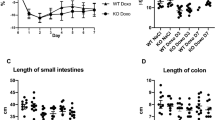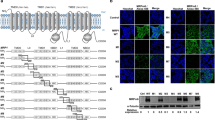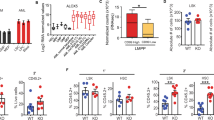Abstract
The multidrug resistance-associated protein (MRP) mediates the cellular excretion of many drugs, glutathione S-conjugates (GS-X) of lipophilic xenobiotics and endogenous cysteinyl leukotrienes1–5. Increased MRP levels in tumor cells can cause multidrug resistance (MDR) by decreasing the intracellular drug concentration. The physiological role or roles of MRP remain ill-defined, however. We have generated MRP-deficient mice by using embryonic stem cell technology. Mice homozygous for the mrp mutant allele, mrp−/−, are viable and fertile, but their response to an inflammatory stimulus is impaired. We attribute this defect to a decreased secretion of leukotriene C4 (LTC4) from leukotriene-synthesizing cells. Moreover, the mrp−/− mice are hypersensitive to the anticancer drug etoposide. The phenbtype of mrp−/− mice is consistent with a role for MRP as the main LTC4-exporter in leukotriene-synthesizing cells, and as an important drug exporter in drug-sensitive cells. Our results suggest that this ubiquitous6 GS-X pump7,8 is dispensable in mice, making treatment of MDR with MRP-specific reversal agents potentially feasible.
This is a preview of subscription content, access via your institution
Access options
Subscribe to this journal
Receive 12 print issues and online access
$209.00 per year
only $17.42 per issue
Buy this article
- Purchase on Springer Link
- Instant access to full article PDF
Prices may be subject to local taxes which are calculated during checkout
Similar content being viewed by others
References
Zaman, G.J.R. & Borst, P. MRP, mode of action and role in MDR. in Multidrug Resistance in Cancer Cells (eds. Gupta, S. & Tsuruo, T) 95–107 (Wiley & Sons, London, 1996).
Loe, D.W., Deeley, R.G. & Cole, S.P.C. Biology of the multidrug resistance-associated protein, MRP. Eur. J. Cancer 32A, 945–957 (1996).
Leier, I. et al. The MRP gene encodes an ATP-dependent export pump for leukotriene C4 and structurally related conjugates. J. Biol. Chem. 269, 27807–27810 (1994).
Cole, S.P.C. et al. Overexpression of a transporter gene in a multidrug-resistant human lung cancer cell line. Science 258, 1650–1654 (1992).
Jedlitschky, G. et al. Transport of gluthathione, glucuronate, and sulfate conjugates by the MRP gene-encoded conjugate export pump. Cancer Res. 56, 988–994 (1996).
Flens, M.J. et al. Distribution of the multidrug resistance-associated protein (MRP) in normal and malignant human tissues. Am. J. Pathol. 148, 1237–1247 (1996).
Ishikawa, T., ATP-dependent glutathione S-conjugate export pump. Trends Biochem. Sci. 17, 463–468 (1992).
Saxena, M. & Henderson, G.B. MOAT4, a novel multispecific organic-anion transporter for glucuronides and mercapturates in mouse L1210 cells and human erythrocytes. Biochem. J. 320, 273–281 (1996).
Gottesman, M.M., Hrycyna, C.A., Schoenlein, P.V., Germann, U.A. & Pastan, I. Genetic analysis of the multidrug transporter. Annu. Rev. Genet. 29, 607–649 (1995).
Müller, M. et al. Overexpression of the gene encoding the multidrug resistance associated protein results in increased ATP-dependent glutathione S-conjugate transport. Proc. Natl. Acad. Sci. USA 91, 13033–13037 (1994).
Zaman, G.J.R., Cnubben, N.H.P., Bladeren, P.J., Evers, R. & Borst, P. Transport of the glutathione conjugate of ethacrynic acid by the human multidrug resistance protein MRP. FEBS Lett. 391, 126–130 (1996).
Zaman, G.J.R. et al. The human multidrug resistance-associated protein MRP is a plasma membrane drug-efflux pump. Proc. Natl. Acad. Sci. USA 91, 8822–8826 (1994).
Pulaski, L., Jedlitschy, G., Leier, I., Buchholz, U. & Keppler, D. Identification of the multidrug-resistance protein (MRP) as the glutathione-S-conjugate export pump of erythrocytes. Eur. J. Biochem. 241, 644–648 (1996).
Lam, B.K., Xu, K., Atkins, M.B. & Austen, K.F. Leukotriene C4 uses a probenecid-sensitive export carrier that does not recognize leukotriene B4 . Proc. Natl. Acad. Sci. USA 89, 11598–11602 (1992).
Domen, J. et al. Impaired interleukin-3 response in pim-1-deficient bone marrow-derived mast cells. Blood 82, 1445–152 (1993).
Razin, E., Mencia-Huerta, J.M., Lewis, R.A., Corey, E.J. & Austen, K.F. Generation of leukotriene C4 from a subclass of mast cells differentiated in vitro from mouse bone marrow. Proc. Natl. Acad. Sci. USA 79, 4665–4667 (1982).
Paulusma, C.C. et al. Congenital jaundice in rats with a mutation in a multidrug resistance-associated protein gene. Science 271, 1126–1128 (1996).
Hay, D.W.P., Torphy, T.J. & Undem, B.J. Cysteinyl leukotrienes in asthma: Old mediators up to new tricks. Trends Pharmacol. Sci. 16, 304–309 (1995).
Chen, X.-S., Sheller, J.R., Johnson, E.N. & Funk, C.D. Role of leukotrienes revealed by targeted disruption of the 5-lipoxygenase gene. Nature 372, 179–182 (1994).
Goulet, J.L., Snouwaert, J.N., Latour, A.M., Coffman, T.M. & Koller, B.H. Altered inflammatory responses in leukotriene-deficient mice. Proc. Natl. Acad. Sci. USA 91, 12852–12856 (1994).
Opas, E.E., Bonney, R.J. & Humes, J.L. Prostaglandin and leukotriene synthesis in mouse ears inflamed by arachidonic acid. J. Invest. Dermatol. 84, 253–256 (1985).
Cole, S.P.C. et al. Pharmacological characterization of multidrug resistant MRP-transfected human tumor cells. Cancer Res. 54, 5902–5910 (1994).
Lorico, A., Rappa, G., Flavell, R.A. & Sartorelli, A.C. Double knockout of the MRP gene leads to increased drug sensitivity in vitro. Cancer Res. 56, 5351–5355 (1996).
Ishikawa, T. et al. Coordinated induction of MRP/GS-X pump and γ-glutamylcysteine synthetase by heavy metals in human leukemia cells. J. Biol. Chem. 271, 14981–14988 (1996).
Zaman, G.J.R. et al. Role of glutathione in the export of compounds from cells by the multidrug-resistance-associated protein. Proc. Natl. Acad. Sci. USA 92, 7690–7694 (1995).
Schinkel, A.H. et al. Normal viability and altered pharmacokinetics in mice lacking mdr1-type (drug-transporting) P-glycoproteins. Proc. Natl. Acad. Sci. USA 94, 4028–4033 (1997).
Schinkel, A.H. et al. Disruption of the mouse mdr1a P-glycoprotein gene leads to a deficiency in the blood-brain barrier and to increased sensitivity to drugs. Cell 77, 491–502 (1994).
Stride, B.D. et al. Structure and expression of the messenger RNA encoding the murine multidrug resistance protein, an ATP-binding cassette transporter. Mol. Pharmacol. 49, 962–971 (1996).
Verhagen, J., Wassink, G.A., Kijne, G.M., Viëtor, R.J. & Bruynzeel, P.L.B., Rapid, simple and efficient extraction of arachidonic acid metabolites, including the sulphidopeptide leukotrienes LTC4 and LTD4, using octadecyl reversed-phase extraction columns. J. Chromatogr. 378, 208–214 (1986).
Author information
Authors and Affiliations
Rights and permissions
About this article
Cite this article
Wijnholds, J., Evers, R., van Leusden, M. et al. Increased sensitivity to anticancer drugs and decreased inflammatory response in mice lacking the multidrug resistance-associated protein. Nat Med 3, 1275–1279 (1997). https://doi.org/10.1038/nm1197-1275
Received:
Accepted:
Issue Date:
DOI: https://doi.org/10.1038/nm1197-1275
This article is cited by
-
ABCC1 and glutathione metabolism limit the efficacy of BCL-2 inhibitors in acute myeloid leukemia
Nature Communications (2023)
-
The Interplay of ABC Transporters in Aβ Translocation and Cholesterol Metabolism: Implicating Their Roles in Alzheimer’s Disease
Molecular Neurobiology (2021)
-
The role of multidrug resistance protein (MRP-1) as an active efflux transporter on blood–brain barrier (BBB) permeability
Molecular Diversity (2017)
-
A simple gene set-based method accurately predicts the synergy of drug pairs
BMC Systems Biology (2016)
-
MRP1 knockdown down-regulates the deposition of collagen and leads to a reduced hypertrophic scar fibrosis
Journal of Molecular Histology (2015)



